Last updated January 2017 | Words and photos by Vietnam Coracle | 35 comments
This post was last updated 8 years ago. Please check the comments section for possible updates, or read more on my Updates & Accuracy page.
INTRODUCTION | MAIN ARTICLE | RELATED POSTS
When I first started riding my motorbike in the Vietnamese countryside, I was struck by the natural beauty of Vietnam. However, even in remote or sparsely populated regions, I always came across large areas that were inexplicably strewn with trash. The litter consisted mostly of plastic bags, plastic bottles, plastic pots, beer cans and leftover food items. The trash was not piled up, awaiting collection; it was spread around, dispersed evenly over large areas: under casuarina trees on swathes of deserted beach; over rocks rising out of mountain streams; on the pine needle-carpeted forest floors of the Central Highlands. These were not informal rural dumpsites; clearly no one was going to come and take it away. I couldn’t work it out. Until, one day, I took a road trip on a Vietnamese national holiday. Now, all of the previously isolated, empty beauty spots, were teeming with people from nearby towns and cities. Hundreds of picnickers were sitting under trees, on riverbanks, on beaches; thoroughly enjoying the great open spaces and natural beauty of the countryside. But very few people bothered to clean up after themselves: the picnic detritus was simply left on the sand, rocks, and in the water. Thousands of scenic locations all over the country are now utterly ruined by trash. It’s sad, disappointing, infuriating, and it doesn’t seem to be getting any better. In fact, it’s getting worse.
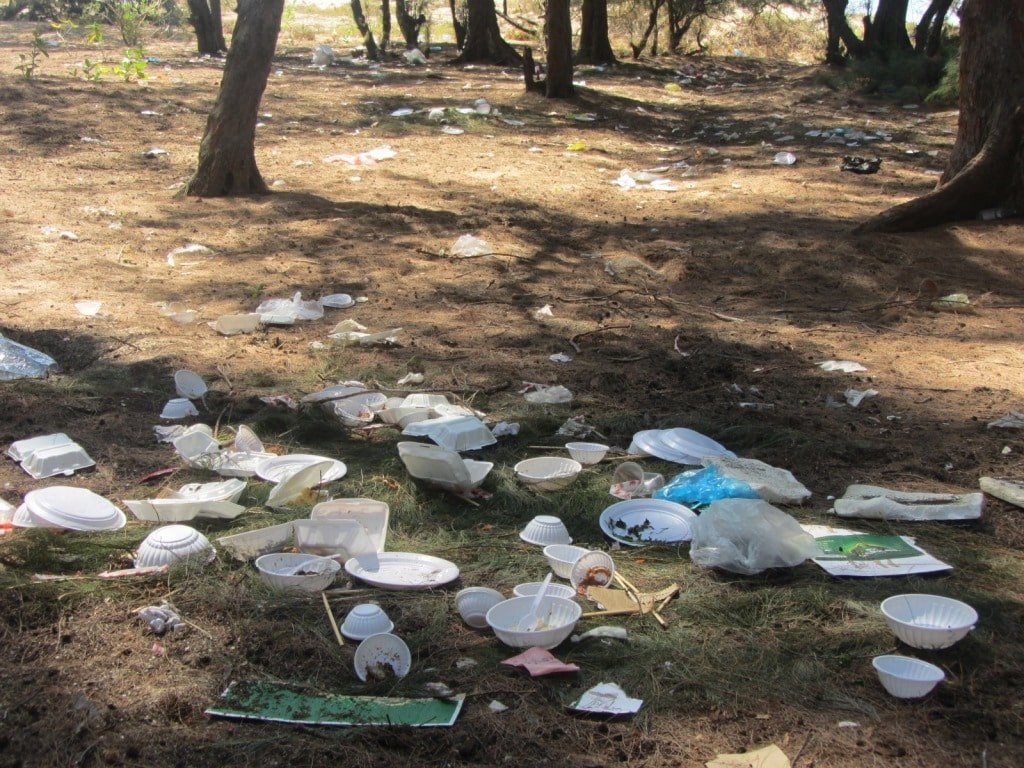 Ruined: scenic spots throughout Vietnam are strewn with picnic trash
Ruined: scenic spots throughout Vietnam are strewn with picnic trash
[Back Top]
ARTICLE: TRASH TALK
How and Why Picnic Trash is Ruining the Vietnamese Countryside
In the past, when I have asked my Vietnamese friends why they think the problem persists, they have often replied, “Chưa có ý thức”, which literally means there’s ‘no awareness or consciousness yet’. However, there are official government signs and billboards dotted throughout the Vietnamese countryside, clearly stating ‘Keep Vietnam green and clean: throw your trash in litter bins’. There are also advertising campaigns on T.V and in newspapers addressing littering, and many school and university projects deal with the issue of litter in Vietnam. Chưa có ý thức is no longer a legitimate excuse or explanation for littering the Vietnamese countryside.

Some Western expats I’ve talked to about the problem, suggest that there simply aren’t enough trash cans and dumpsters in scenic spots in Vietnam: People would gladly throw garbage in bins if they were provided, but as they are not, the most convenient option is to leave it behind. I agree that this is certainly the most ‘convenient’ option. But these days there are plenty of litter bins in rural Vietnam, and even if there aren’t – which is often the case in more isolated beauty spots – is it really that ‘inconvenient’ to put your trash in a plastic bag and carry it with you until you find a dumpster? Unfortunately, litter bins are often ignored by picnickers in Vietnam: I’ve seen people nonchalantly throwing beer cans down mountainsides and into lakes when there’s a litter bin just a few feet away.
 Why? Trash left by picnickers under trees next to a beach on the south-central coast
Why? Trash left by picnickers under trees next to a beach on the south-central coast
It seems particularly sad to me that the catalyst for litter in Vietnam’s beauty spots should be picnicking. I have never seen a nation enjoy picnics in the countryside as much as the Vietnamese do. It’s a wonderful tradition and one that highlights the bond between Vietnamese people and their land. This is a bond that goes back centuries – there are poems and stories about it – and most Vietnamese are proud of the physical beauty of their country. What better way to express this than a picnic in the landscape?
On weekends and national holidays, scenic spots – especially those in the shade or by water – buzz with large groups of friends and families, sitting in circles around makeshift barbecues. There’s food, alcohol, laughter, games, guitars and song. If you’re a foreigner you will almost certainly be asked to join in; offered copious amounts of food and beer or rice wine, and politely interrogated about your love/family life, your job/salary, and your impressions of Vietnam/the Vietnamese.
Picnicking in Vietnam is an outpouring of joy: a celebration of freedom – from work, from the city, from the banalities of day to day life; a Dionysian abandonment to food, conversation, music and just plain fun. Occasionally, when too much alcohol is consumed, things can get out of hand. But, in general, Vietnamese picnics are joyous occasions. The question is, of course, why does this love of picnics in the countryside and pride in the landscape not translate into respect for the landscape? Why do so many people leave their trash behind?

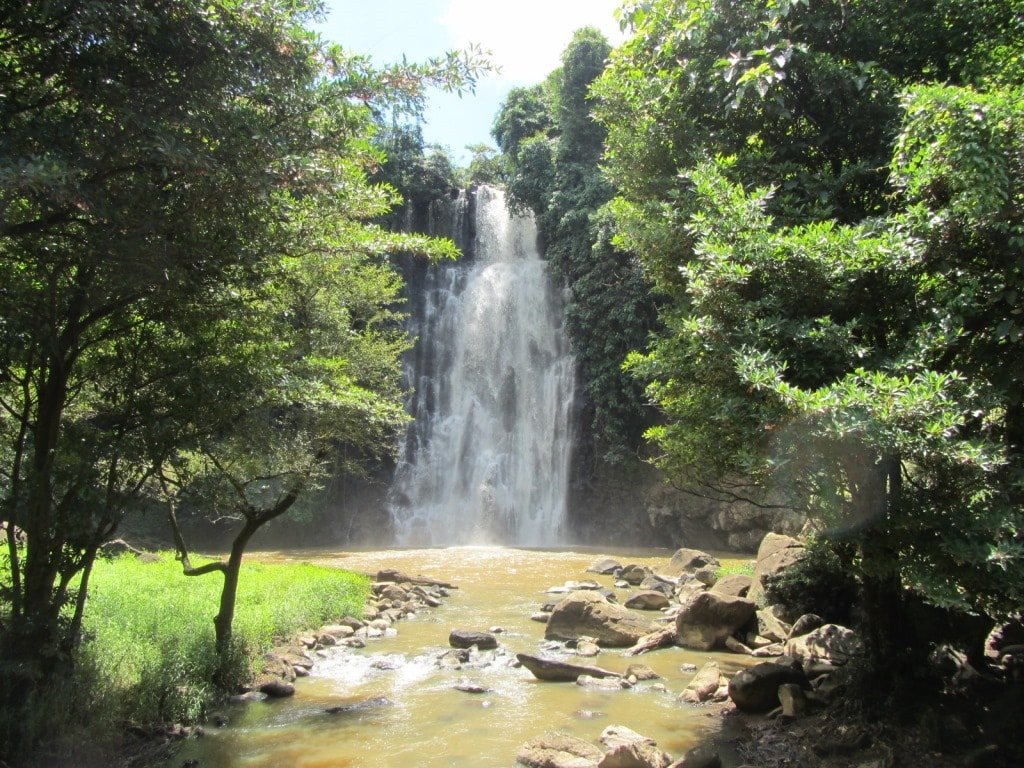 Natural beauty; national pride: waterfalls are favourite picnic spots – it’s easy to see why
Natural beauty; national pride: waterfalls are favourite picnic spots – it’s easy to see why
I think the reasons behind the litter problem in Vietnam, especially with regard to picnickers, are not so much about awareness and provision of garbage cans – although these certainly have a large role to play – as they are a matter of psychology. Like most of my friends when I was growing up, I littered until sometime in my early teens. Looking back, the reasons are quite clear. On the one hand it was pure laziness: I couldn’t be bothered to walk five minutes to the nearest bin, and the whole attitude of nonchalance and indifference was part of being ‘cool’. On the other hand, I just didn’t think that correct trash disposal was my responsibility: when I was a kid it was my parents’ job to clean up after me; when I was a teenager it was somebody else’s responsibility: the local council, the government – someone, anyone, but me. Like most people, I’d rather the streets where I lived were clean and not strewn with trash, I just didn’t think I had a part to play in implementing this.
Likewise, on countless occasions in Vietnam, when I have witnessed someone littering and then asked them – sometimes politely, sometimes angrily – to pick up their trash and put it in the bin, invariably the person acquiesces, apologizes, and proceeds to talk about the problem of litter in Vietnam. Never has someone reacted angrily or said ‘no’. So why didn’t they throw their trash in the bin in the first place? I think the answer is the same as it was for me when I was a teenager: partly it’s laziness, and partly it’s people thinking the responsibility lies with someone else.
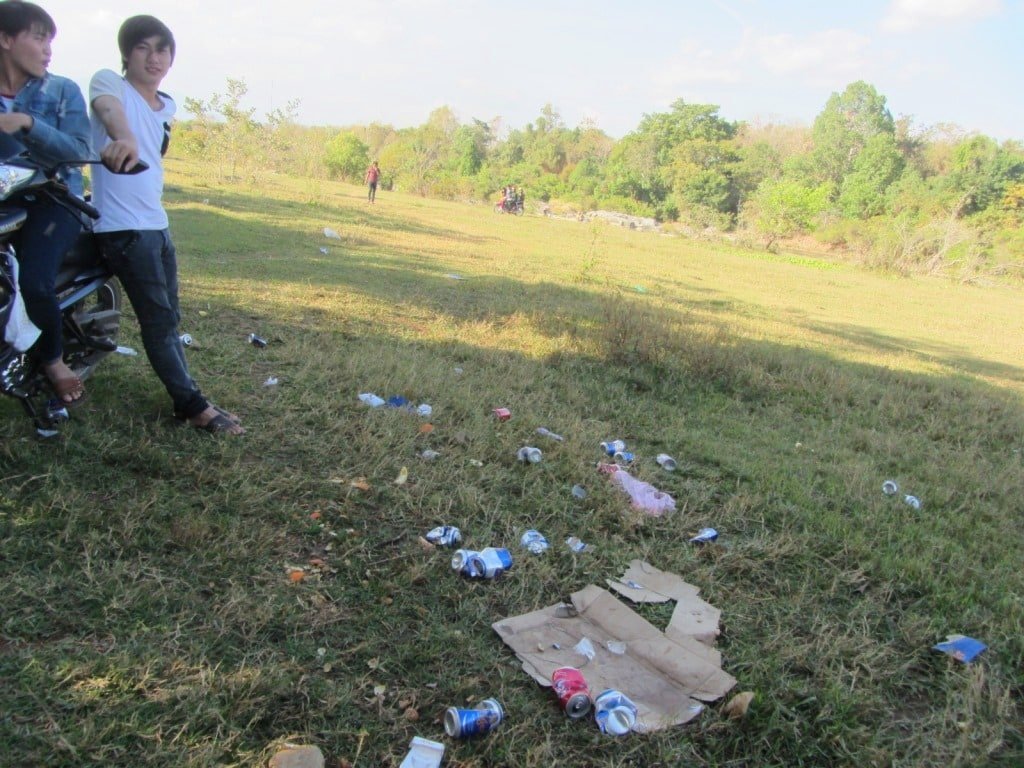
Someone else will clean it up: teenagers about to leave their picnic site in the Central Highlands
Trash collection in Vietnam’s urban areas is pretty darn good. There are two daily collections on the street where I live in Saigon. Add to that the ‘trash snatchers’ – people who rummage through household garbage before the collection, looking for anything that can be recycled or sold – and you have a very efficient waste collection system. The problem is that when urbanites step into the countryside – for picnics on public holidays, for example – they assume that a similar system is in place; someone else will pick up their litter on their behalf. But there is no trash collection in the highland forests, mountain streams, or on the beaches: the rubbish that picnickers leave is never collected; it stays there for a very, very long time.
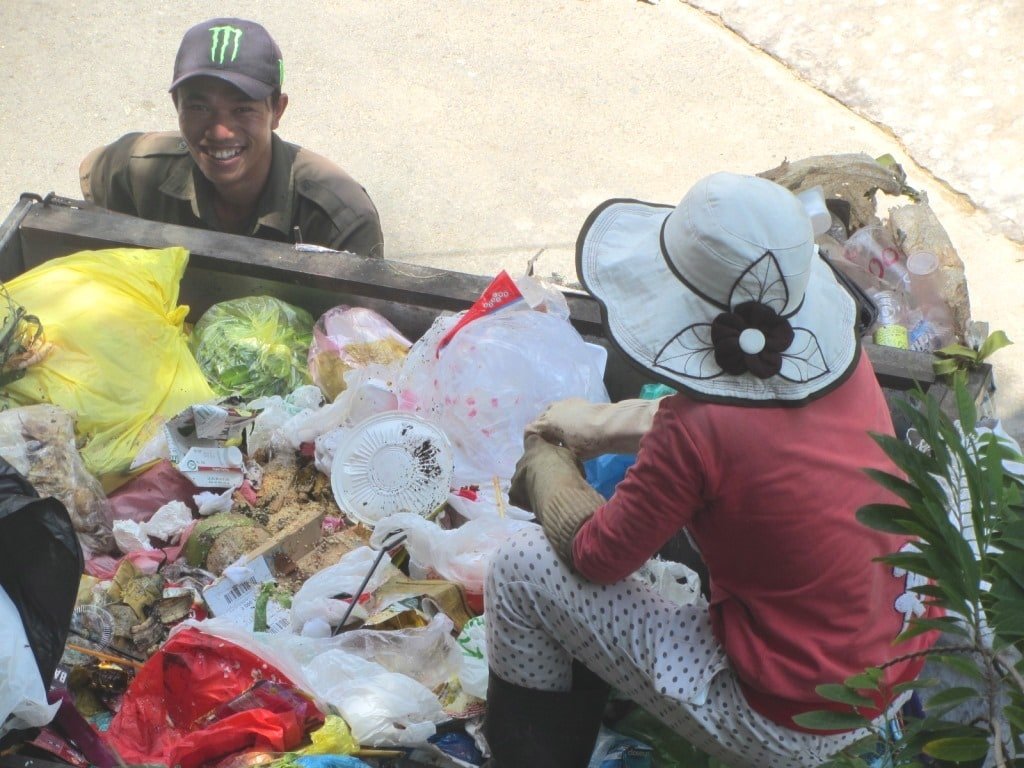
Efficient: urban trash collection in Vietnam is excellent
Some Vietnamese people I talk to suggest that, for Vietnam’s nouveau riche, it’s a matter of pride: cleaning up trash after themselves is simply beneath them. Also, the countryside represents the past; the old, the poor, and the backward. Cities, on the other hand, represent Vietnam’s glittering, wealthy future. A couple of years ago I was watching an episode of the T.V show, Mad Men. There is a scene where the main family is having a picnic in a park. They are fairly wealthy suburbanites living the American dream in 1960s New York. They dress fashionably and act respectfully (at least in public), and they display all the trappings of success: they are a modern, nouveau riche family. When they finish their picnic, the wife shakes out the picnic blanket, sending all the trash and food over the grass. She folds the blanket – leaving the trash where it fell – and the family gets in their car and leaves. It immediately made me think of picnickers in Vietnam. Exactly what point is being made in this scene is an interesting topic of discussion (as you’ll see by reading the comments below the video clip). This is booming, post-war America; many people are getting rich and moving to the cities, embracing materialism and modernity. There are many socio-economic and environmental similarities between 1960s America and present-day Vietnam; perhaps attitudes to trash is one of them.

Mad Men: Don Draper and his family take a picnic and leave their trash behind
Vietnam has no shortage of scenic spots, many of which are ideal for picnics. New roads are constantly being opened, easing access to more and more remote, beautiful parts of the country. But this means easier access to more potential picnic spots and, if the current trend doesn’t change soon, that means more trash covering the countryside. Vietnam is a relatively small country with a large population: if things continue as they are, there will be very few beauty spots left that aren’t covered in picnic trash. In late 2014, I spent two months travelling the length and breadth of Vietnam by motorbike. I hate to say it but, although the areas of natural beauty were many, the areas of pristine countryside – clear rivers not clogged with plastic bags, beaches not strewn with trash, forests not full of beer cans – were few.
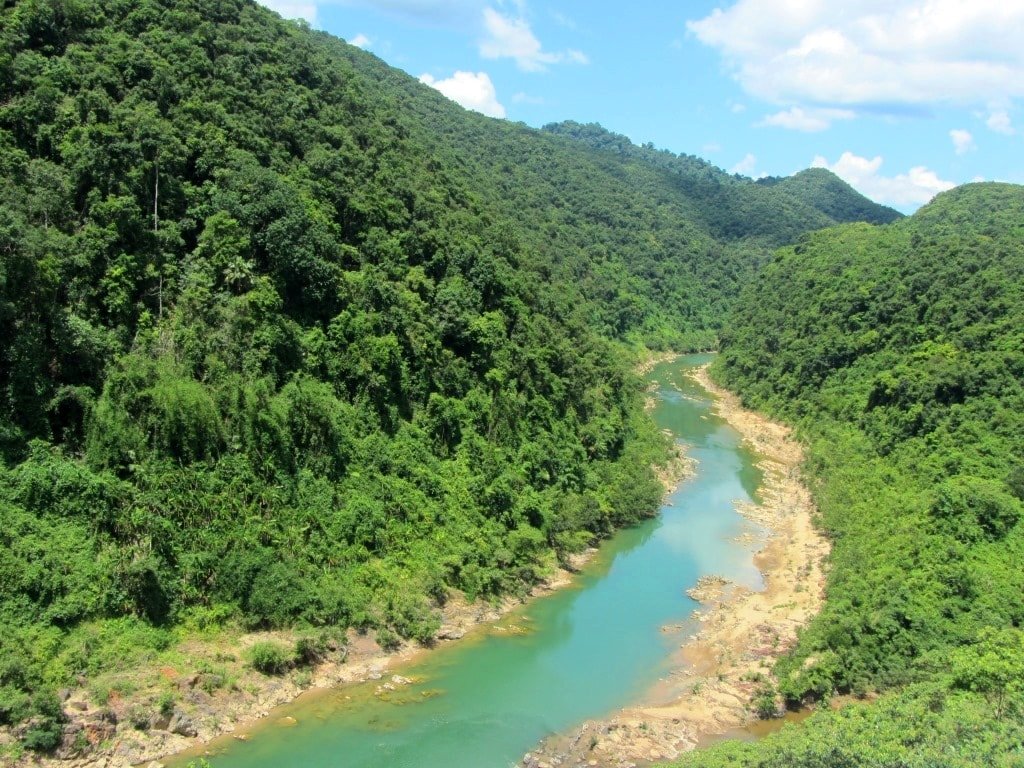
Pristine: the central ‘spine’ of Vietnam, near the Lao border, remains largely untouched by litter
Even Ha Giang, the northernmost province, long considered the final frontier for travel and tourism in Vietnam, is starting to suffer from litter. A region famous – even legendary – for its extraordinary natural beauty, is about to join the ‘picnic trail’ and find itself strewn with picnic trash. After years of riding through Vietnam I have come to see it as inevitable that, once a new road is completed in a scenic area, it’s just a matter of time before picnickers leave their lasting mark. I have travelled on new roads on the south coast, the Central Highlands, and the northern mountains not long after they have been completed: invariably, when I return the next year, they are marred by litter. This depressingly familiar pattern shows no sign of changing.
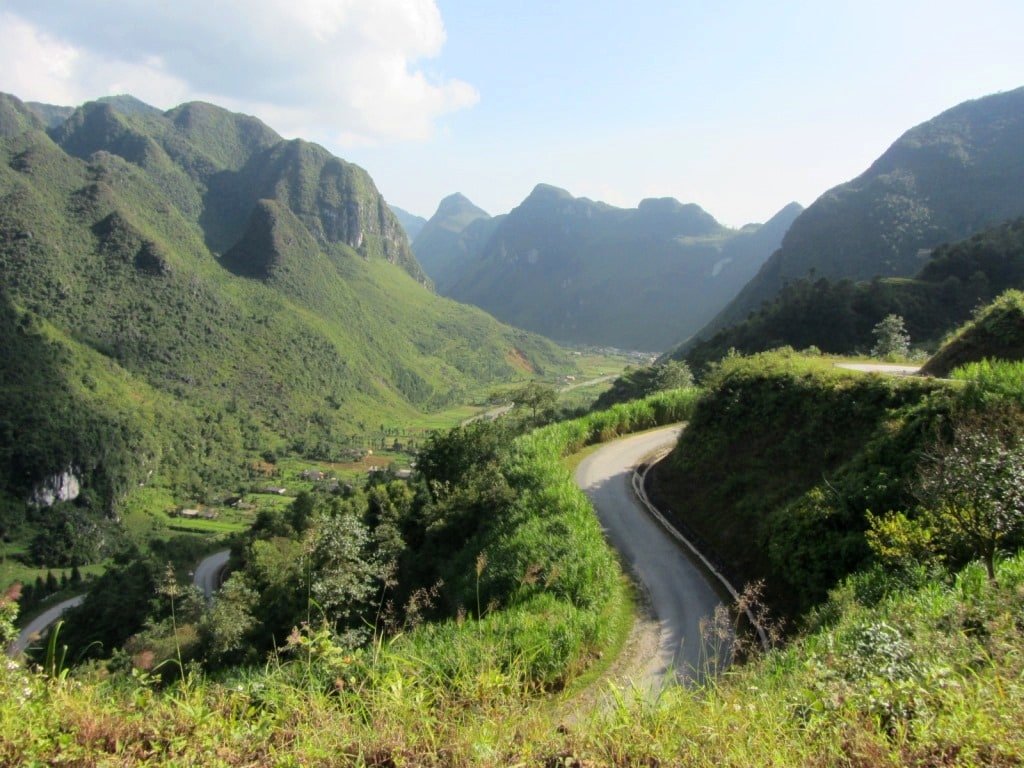
New roads: remote and beautiful areas, such as Ha Giang, are more easily accessible than ever
Ironically, at the moment it seems the only way to protect Vietnam’s natural beauty spots is to build on them. Once a hotel, resort, or luxury apartment is built on a scenic plot of land it is kept clean, and potential litterers – picnickers – are kept away. This is very sad for a number of reasons, not least because it means that scenic spots will only be open to the few who can afford luxury hotels and condos. Phu Quoc is an obvious example: Dai Beach, in the northwest of the island, was a long stretch of empty white sand, shaded by casuarina trees. It was relatively clean – save for some flotsam and fishermen’s trash – until the island’s airport and roads were upgraded, and access became far easier. After that, Dai Beach became a favourite picnic spot on national holidays and started to fill with trash. Last year, a major resort/casino development called Vinpearl, was completed on a large section of Dai Beach: now this is the only part of the beach that is truly clean; only accessible if you can afford $200 a night for a room.
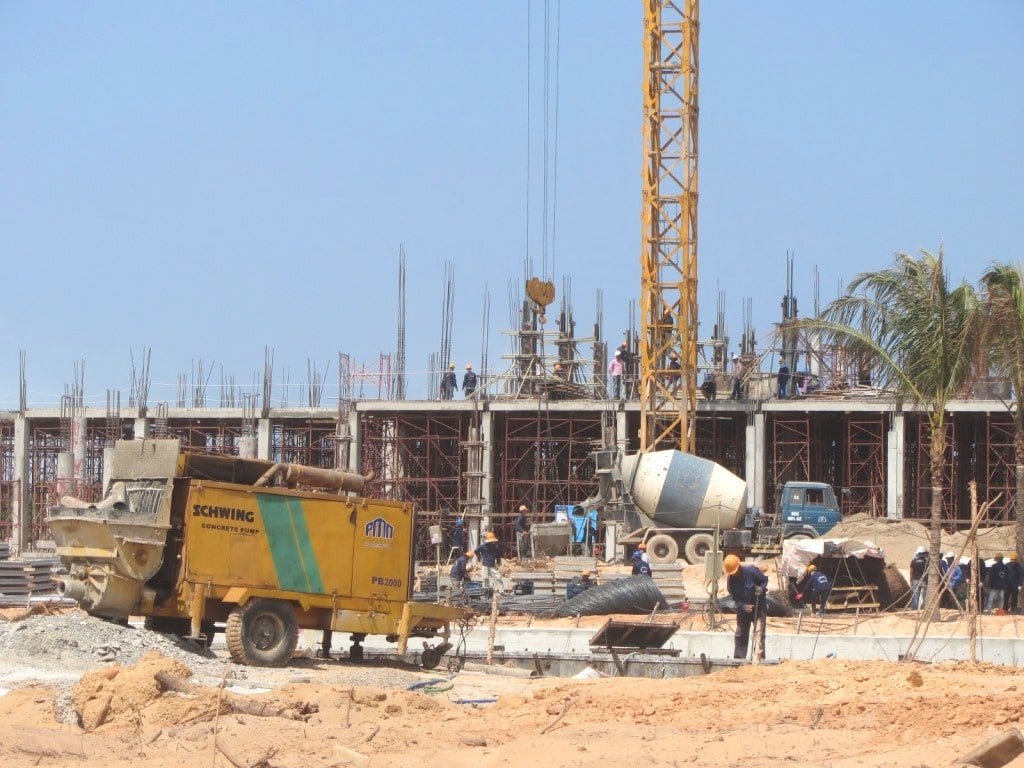
Build to protect? Construction on Dai Beach, Phu Quoc Island
More education – raising awareness – is obviously a good idea, but it seems to have had little impact so far. More trash cans in scenic spots would help, but there are plenty already in place and they are often ignored. Danang, perhaps Vietnam’s most forward-thinking city, tried a ‘littering hotline’, where people could call to report littering and receive a cash reward for their efforts. But the motivation for this is money rather than social conscience. It would be nice to think that dealing with personal trash responsibly is its own reward: next time you go for a picnic in the countryside you will not be surrounded by trash; next time you visit Ha Giang you will not have to wade through plastic bags and beer cans to reach a viewpoint.
Obviously there are much bigger, more serious environmental issues in Vietnam. But picnic trash in the countryside seems to me to be one of the most immediate and visible problems. It is also one that can be directly affected – or even solved – by our own individual actions, and without too much effort. This problem can’t be blamed on big corporations, or politics, or globalization. This problem is in our own hands; it’s our responsibility to clean up after ourselves: Let’s keep Vietnam looking its resplendent best: Let’s put our trash in garbage cans. Hãy giữ gìn Việt Nam xanh sạch đẹp: Hãy bỏ rác vào thùng.
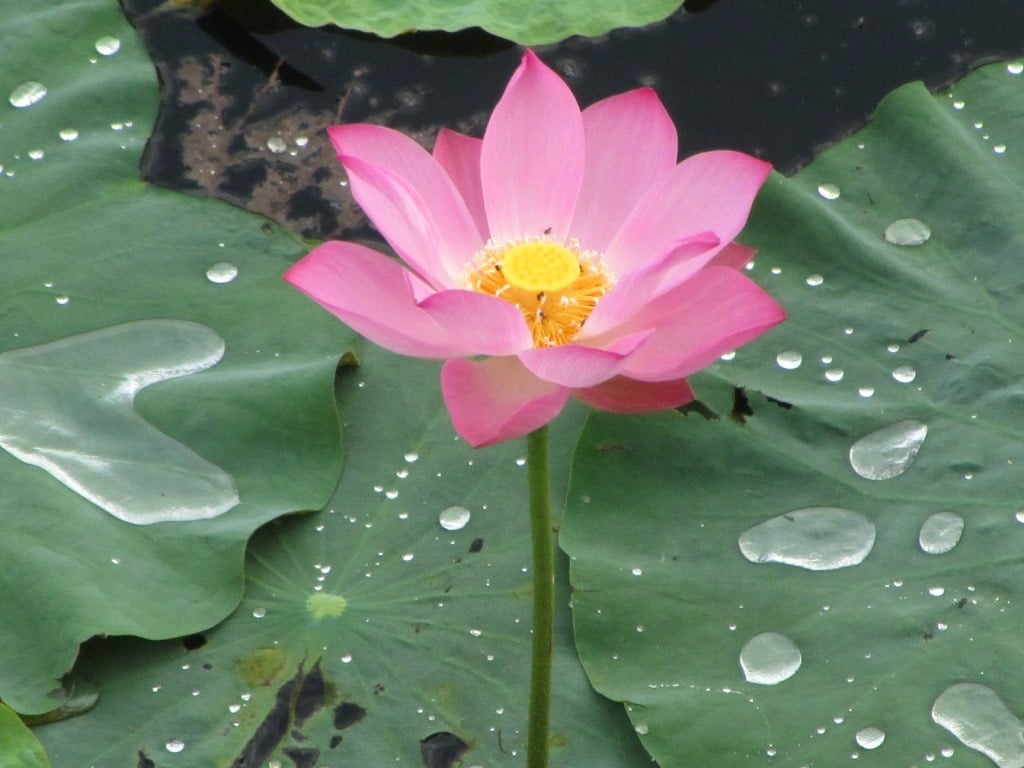
Keep Vietnam looking great: throw your trash in bins
RELATED POSTS:
[Back Top]



I just toured Vietnam north of Hanoi for ten days. I thought I was the only one who noticed the trash. Good article. I was wondering if I would embarrass anyone, or cause them to lose face, if I started picking up the trash on my own. Here in the United States, there are ongoing trash cleanup days. Especially on the beaches and one famous scuba diving spot on the Florida coast. So, it’s not just Vietnam that experiences thoughtless people.
Hi Paul,
Yes, it’s a big issue. Public awareness is now high, there are many government campaigns, and regular clean-ups all across Vietnam, but the problem is, obviously, much too big for these to make any big difference. I think the process will be slow, but things will improve.
Best,
Tom
Aside from the seemingly incessant honking practically everywhere (and other noise pollution) which ‘follows’ you regardless of whether you are in traffic or in your home litter is my biggest pet peeve about Vietnam (as it would be and is anywhere in the world that it exists).
I wonder if part of it is because, in some ways, people are kind of spoiled about trash?
I’m not sure what it is like outside of Vung Tau but here we have our trash collected every day. EVERY DAY. As convenient as that may be I think it is excessive and unnecessary. It seems to make some people (one of my neighbours in particular) neurotic about their garbage and the collection of it. I personally think it would be beneficial for people to have to manage their trash in/near their homes for longer periods of time. If nothing else it would force them to see how much waste they produce.
Street cleaners (I refer to them as ‘not your mother’ to people who litter) are common and efficient to the degree that people who live on streets frequented by street cleaners often just sweep and throw trash out their door onto the curb and street rather than even putting it into bags, baskets and boxes for trash collection.
There is an army of unofficial recyclers (usually women on bicycles) who travel the streets and lanes of the city collecting recycling, sometimes even paying people for it. Still, I often see recycling mixed in with common trash and there are a lot of items that though technically recyclable are not recycled in the city. Why is the country on a whole not managing this? Could they not create more jobs and a business through nationwide recycling and the creation of raw material?
I do agree that education and awareness are a big issue but (what I consider) pampering people as such doesn’t usually result in personal responsibility and, for the record, I don’t see this as a Vietnamese problem in general but, as with anyone anywhere in the world, a problem with a particular type of person regardless of their numbers in a particular country.
GD
The same problem in Thailand’s countryside. We must educate younger generation actively and seriously.
Thanks, Ying.
Yes, I’m partly involved in primary education in Vietnam and the problem of litter is definitely taught.
Tom
Hi Tom
A very hot button issue for me as you know, and with about 28 years here, I used to be a pretty big apologist for the behavior. of the vietnamese.. No longer.
Back in the day it was very simple, there was no plastic, everything you brought came wrapped in a banana leaf, so when you pitched the wrapper off the roof of the bus, (where you were riding with 20 other people to escape the farm animals and massive overcrowding inside) it was no big deal, as the banana leaf would naturally degrade. Co-incidentally, everybody was poor, and few and far between were the rip offs.
Then, they came up with Doi Moi…and plastic.
For the simply ignorant, we just have to wait for them to die off, as they will never change. For the wealthy, the attitude is clearly “The entire world belongs to me, to with as I choose” that group will never change and they pass it on to their kids.
For the rest ? Okay, some do care, but the vast majority do not, in the me, me, ME ! culture. The same reason they drive so horribly dangerously, and often as not drunk.
This country is plastered with signs about, clean green….They have the message, they do not care.
Just last week I was walking past one of the national park boats, and had the displeasure of watching bag after bag of trash thrown overboard into the sea. A sea which I am known for trying to save a little piece of all over the country, on the street in HCM I am addressed addressed as “The crazy man who thinks he can clean the ocean” My efforts have generated countless t.v. segments, local, provincial, national and international.
We clean the mess here daily as a matter of policy….When my boat comes back laden with trash, I have to pay to haul it off to the dump, the government and national park do not care, expecting the people to care ?
Get rid of the me ! me! ME! that infests the culture, and there is hope. Anything short of a major cultural shift, and this will not change.
Sorry for the rant, remove as you feel appropriate. Myself I am disgusted.
Hi Larry,
Thanks for your comment.
Yes, I agree with much of what you say, especially about how ‘trash’ used to be biodegradable.
I still believe, however, that education and awareness play an important role in this issue, just as it does with driving in Vietnam. Many people often point to the examples of Greece or Italy or Spain: if you holidayed in those countries a generation or more ago, the litter was appalling; but now it is better. As with so many things in Vietnam, this is the first (well, second, I guess) generation after Đổi Mới and the advert of industrial scale plastic and non-biodegradable waste. Although I am massively discouraged and depressed by the state of litter in Vietnam and people’s attitude towards it, I remain cautiously optimistic that it may get better in the future. Certainly all my young Vietnamese friends are disgusted by litter and would never do it themselves, and I would imagine they will pass the same attitude on to their children when they have them.
Please don’t stop your ‘crazy’ efforts to ‘clean the ocean’ – they do not go unnoticed – by me and by many other travellers (both foreign and Vietnamese) to the Con Dao Islands – and they do make a difference and set an example for others.
Tom
The really strange thing about Vietnamese is that the inside of their houses and their yards are almost spotless, it’s a case of ” not in my backyard “, I know of a fight between neighbours over rubbish being thrown over the dividing fence, it ended in a death.
Also try and ask a local where the rubbish that’s being picked up actually goes??? no one knows , or cares, as long as it’s gone from their area..
Hi Chris,
Yes, I’ve witnessed that kind of attitude between neighbours before too – it does seem rather baffling.
I’m not sure if many people in Western countries know or care where their rubbish goes either, at least not until relatively recently.
Tom
We plan to start working soon on plastic pollution here in Nha Trang, the situation will definetly improve, but slowly, becouse now it is anti-poverty fight and consumerism psychology, so people don’t understand very important basics. I hope we can keep balance between pollution level and environment, and Vietnam will get better soon! 🙂
Hi Boris,
Sounds promising. Yes, I hope so too. But having just seen the awful trash left around the countryside during this year’s Tet holiday, it’s obviously going to be a very long process. No doubt initiatives like yours will be instrumental in making the change happen.
Tom
VN school kids learn about pollution and it’s impact now, but does that stop them tossing their rubbish everywhere??? But they’re also taught about ” road safety ” in schools as well, lol.
Hi,
Yes, but education about littering is becoming more and more common, and most of the young Vietnamese people I talk to in Saigon abhor littering. So I think it will eventually have an impact, but it will take time. The same applies to road safety. At least I hope so.
Tom
Thanks for the article !
I’m going to spend 3 months in Vietnam researching eutrophic lakes/rivers so was wondering if you could specify where the 7th picture in your article was taken ” Pristine: the central ‘spine’ of Vietnam, near the Lao border, remains largely untouched by litter ”
I know you mentioned it was near Laos, but any chance you have more details about the location ?
Greets,
E
Hi Emilie,
Yes, the river in that picture is on the Western Ho Chi Minh Road in central Vietnam, between Khe Sanh and Phong Nha. The Western Ho Chi Minh Road and Phong Nha Ke Bang National Park is a great place to go if you’re looking for eutrophic lakes and rivers 🙂 You can read more about the area here.
I hope this helps,
Tom
I have spent a total of three years in Vung Tau and it has so much potential considering it’s location to the sea. But the filthiness of it’s beaches is disappointing and it is especially disheartening to see young Vietnamese people unthinkingly drop packaging on the shore (and elsewhere). People in Vietnam often express such an patriotic fondness — Vietnam Number One! — for their home but this sentiment is so often missing in their actions.
It’s no excuse but much has to do with awareness education and examples set by others and, of course, this is a problem the world over even in so-called developed countries where the citizenry tend to consider themselves superior in many ways.
A large part of the litter and pollution issue on beaches has also to do with it entering the sea from other shores and from vessels at sea. A large reason popular beaches are so clean in a city such as Vancouver is because of aggressive cleaning. I was shocked some years ago when at the Queen Charlotte Islands I discovered largely unaccessible beaches covered in trash at the high tide mark. And I think most people are well aware of the devastating impact our reliance on plastic is having on the oceans and sea life.
So much more should be considered by manufacturing companies in regard to their products but the individual consumer should never forget that they have the ultimate power firstly in what they choose to purchase and then in what they choose to do with it.
Ultimately I am quite cynical and have little faith in the majority overcoming apathy and embarrassment to do what is best for the world and themselves. However I do know that there are many people that do care and make an effort and I applaud the example they provide. They are they and beauty and joy of an otherwise largely uncivilised species.
Hi Yuri,
Thanks for your comment. I agree that big companies – factories – are also to blame for polluted waters, but it’s ‘casual trash’ – the general litter – that’s so visible on Vietnam’s beaches these days. I think people are becoming more aware of the problem and of how to dispose of personal trash responsible – there’s been a lot in the press over the last month – but it needs to happen soon because some of the beaches are getting beyond help.
Tom
Wow , I was nearly in tears after reading that….
Being lucky enough to live in British Columbia , a stunning temperate rainforest with a coastline longer than Vietnam, we are wise enough to pack out what we brought in…..Even at the small coastal village I live in there is a “clean the foreshore” week every summer where over a 100 folk spend the days cleaning the beaches of detrius for a 5 mile length of our shoreline.
As the tourists from the far east keep finding our little enclave (only a couple of hours out of Vancouver) we get dismayed by their lack of awareness over trash. This summer I had to make quite a few groups/families aware that it was not OK to come to the public beach park, eat fish and chips from the local shop and leave EVERYTHING at the picnic tables…….There are 3 sets of large dumpsters for trash and recycling in open view!
Education is the only Key.
The old adage that “It takes a village to raise a child” should also start to encompass “It takes an awareness to keep a planet”
I will be carrying a box of trash bags as I travel Vietnam and continue to do my small bit to keep it clean.
Hi Robbie,
Yes, I think you’re right: it’s mainly a question of awareness and education. There are some local initiatives, like the one you mention on the British Colombian coast, but they are few for the time being.
I’m pretty confident that it’ll get better soon. But, for now, the trash is some of the more popular beauty spot can be atrocious.
I hope you enjoy your trip to Vietnam,
Tom
I have been living here for over two years now and I also think it’s a matter of education, awareness, politeness and respect. I have seen bus drivers throwing empty plastic bottles or glasses out of the window, little kids dropping garbage out of their doors or windows with an air of complete nonchalance, women throwing garbage to lakes or rivers… for me it’s something deeply unsettling.
I know I should stop weening over it and start doing something about it, but apart from getting a big bag and a trash grabber, what else can I do?
Hi Diego,
Yes, it is frustrating. I agree that you can help by setting an example in the way that you dispose of your own trash and also by pointing out – politely – when you see other people littering. But the issue is starting to be addressed in Vietnam. The Clean Up Vietnam Day, for example. There are other initiatives now too: it’s certainly starting to enter into the national consciousness.
Tom
I live in Central coastal VN, I used to walk my dogs on the beach, but stopped due to the amount of excrement, ( often human ), and it wasn’t unusual to see truckloads of locally picked up rubbish dumped on the beach, ( waiting for high tide to carry it away ), and dumped also in cemeteries, I’m hoping they’ve stopped this practice since the introduction of rubbish compactor trucks last year, but still, no one can tell me where this rubbish is actually going now???
Hi Chris,
Sounds horrible. I hope it gets better now with the trucks.
Tom
This is an excellent article on all the littering that is going on. Please have a look at the facebook page on “plastic bag littering” in https://www.facebook.com/greenifysaigon"; TITLE="Greenify Saigon".
Also please contribute to that page. Altogether we can make a change (hopefully)
Hi Marcel,
Thanks. I will have a look at Greenify Saigon.
Tom
Thanks for the article! What I find interesting about the situation is that places like Ha Long Bay and Hoi An, both UNESCO world heritage sights, are relatively clean compared to other tourist or scenic places in Vietnam that aren’t overseen by international bodies. I wonder if that’s a good thing and the practices will rub off or if means that it’ll never change because the local management doesn’t have the cause to learn..
Hi Jessica,
Yes, that is interesting. Personally, I think Halong Bay has it’s fair share of trash, or at least pollution in the bay from shipping and coal mining near by. But, in general I agree that the more popular tourist sites, such as Hoi An and Hue, seem to be kept much cleaner than anywhere else. I think this is partly to do – as you say – with the UNESCO involvement, and partly because there is money to be made by keeping it clean: the tourist buck is important to Vietnam. Also, because these places receive so many foreign visitors, it would be a great embarrassment to Vietnam if, for example, the streets of Hoi An were strewn with trash. In this sense, I think that tourism plays an important role in raising awareness of trash in Vietnam.
But it is scenic areas away from the established international tourist trail that are really suffering. Domestic tourism is huge in Vietnam, but many favourite spots for domestic tourists are not kept clean like Hoi An or Hue. But, it clearly can be done with the right effort: I was at Pac Bo Cave recently: it’s a remote and beautiful spot, hugely popular with domestic tourists because of its association with Ho Chi Minh, yet it was immaculately clean: clearly the extra effort had been made – both by local authorities and tourists – to keep this site free of trash out of respect for Uncle Ho. If the same kind of respect was extended to the rest of Vietnam, they’d be no litter problem at all.
Tom
Hi Tom
Where are all those sociology Ph.Ds when you need them?
There must be doctoral theses from many countries which try to explain this phenomenon.
I saw a few days ago the mountain of rubbish strewn over the site of the Glastonbury Festival in UK. As well as music the theme of the whole festival is based on ‘green’ principals of recycling etc. etc. Go figure!
Hi Alan,
How ironic.
I suppose when you’re have a good time there’s no room to think about that kind of thing – I think the same is true of picnickers in Vietnam: they’re just too busy have fun to worry about the trash 🙂
Tom
It’s disappointing to hear that trash is such a problem in Vietnam. In Australia we have a project called Clean Up Australia which has been going for some 20 years. It has gone a long way to raising peoples’ awareness to the problem of litter. There are also organisations which profit from recycling plastics waste materials.
Hi Christobel,
Sounds like a good idea. I’ve seen similar projects at a local level in Vietnam, but none have spread nationwide, as far as I know.
Tom
Hi Tom,
The Mad Men reference was interesting. It must have been set in the mid-60’s. In the late 60’s and 70’s we began to get more anti-littering PSA’s at home, and most people became more aware of the problem.
I was just in Phu Quoc and the beautiful beaches had far too much litter. There are so many scenic spots in Vietnam, but the people don’t seem to understand the relationship between their own litter and how it effects the landscape. Maybe the frequency of urban trash pick up spoils people when they’re in the countryside. It’s something that can be learned relatively quickly, though.
Hi Kevin,
Yes, I think you’re right. I think Vietnam is going through a similar stage as America in the 1960s, and people’s attitudes to personal trash and awareness of the problems and consequences of it will change, just as you say they did in the late 60s/70s in the US. I hope it happens soon though – places like Phu Quoc can’t take much more of it – the deterioration of the beaches is so fast.
Tom
Thanks, I like the balanced views, those of us who have spent time in Indonesia remark how ‘clean’ Vietnam is.
Hi Mig,
Thanks interesting. I haven’t spent enough time in Indonesia to notice that. I remember spending a lot of time in Greece when I was a child; there was a similar trash problem there then, but as the years went by it got better: I hope the same will happen in Vietnam.
Tom